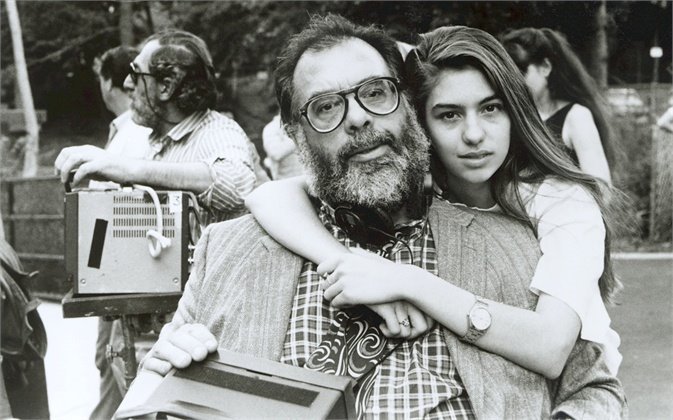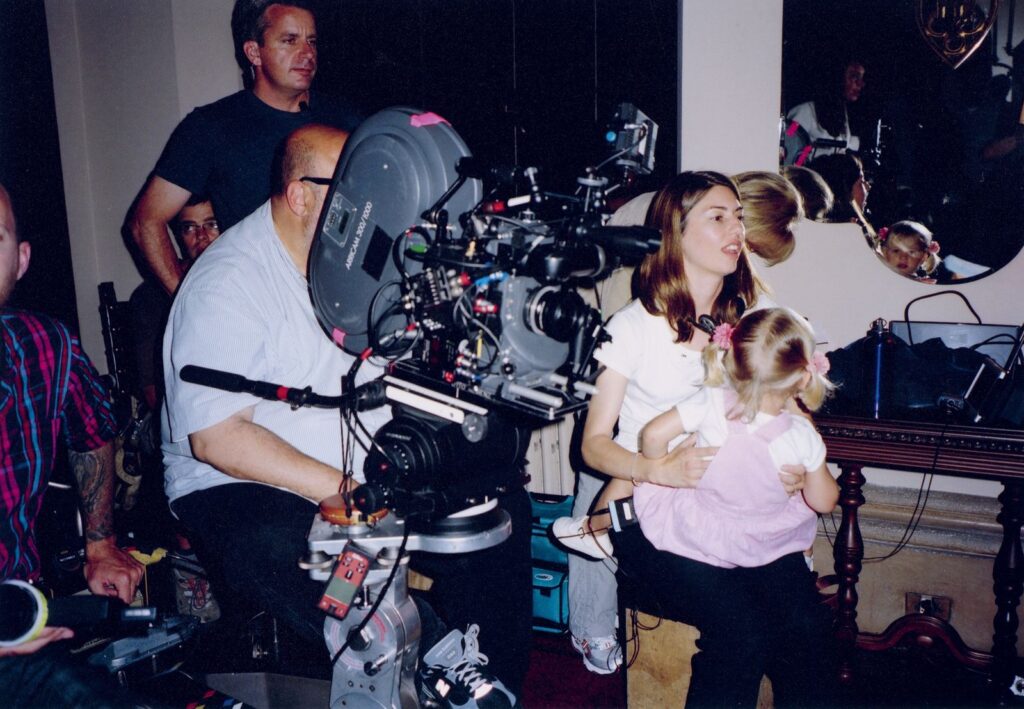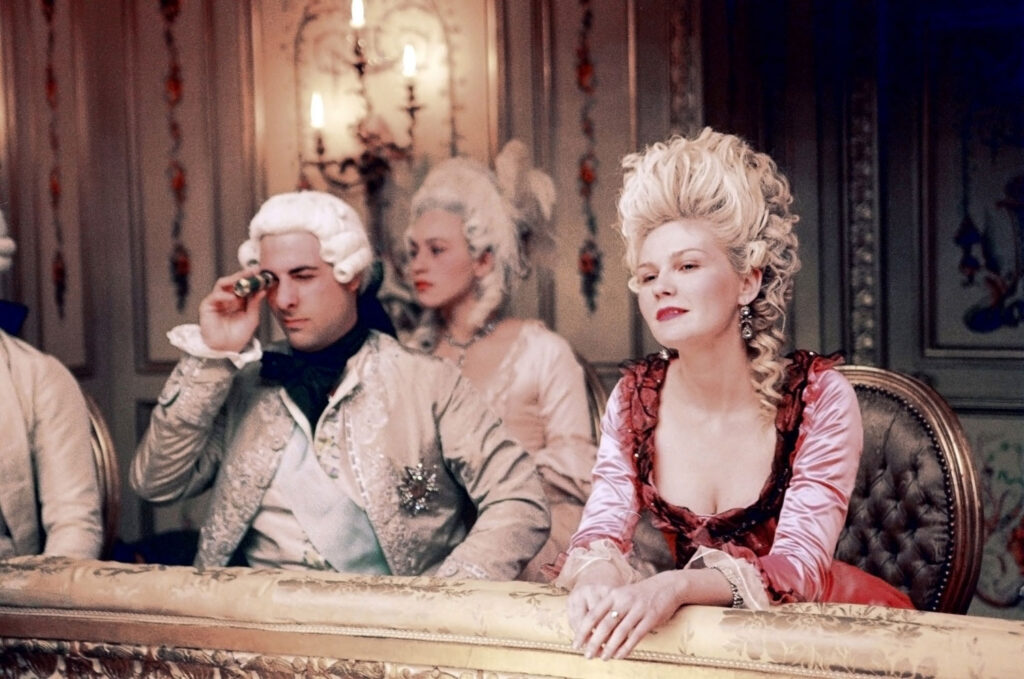“From dreamy visuals to groundbreaking storytelling, Sofia Coppola has carved out a space in Hollywood that’s uniquely her own—proving why she remains one of the industry’s most influential voices today.”

When you think of Hollywood’s most powerful storytellers, Sofia Coppola’s name naturally shines through. She’s not just a filmmaker; she’s a visionary who crafts worlds filled with quiet intensity, emotional depth, and an unmistakable style. From her haunting debut The Virgin Suicides to the Oscar-winning Lost in Translation, Coppola has built a career that’s both daring and deeply personal. In an industry often dominated by loud blockbusters, she reminds us that subtlety and softness can be just as impactful. This is why, even after decades, Sofia Coppola continues to stand tall as one of Hollywood’s most influential voices.
Early Life & Background
Sofia Coppola was practically born into the world of cinema. As the daughter of legendary director Francis Ford Coppola, filmmaking was woven into her childhood. Growing up on movie sets, she didn’t just watch films being made—she lived them. But what makes her story inspiring is that she never leaned only on her famous last name. Instead, she carved her own path, slowly discovering that her voice as a storyteller was different from her father’s.

While her family’s influence opened the doors, Sofia’s natural curiosity and artistic eye helped her step through them with confidence. From experimenting with photography and fashion to eventually directing, she explored creativity in all its forms before realizing that film was where her heart truly belonged. Her background gave her the foundation, but it was her individuality and vision that set her apart.
Breakthrough in Filmmaking
Sofia Coppola’s real breakthrough came in 1999 with The Virgin Suicides, a film that instantly marked her as a fresh new voice in Hollywood. Adapted from Jeffrey Eugenides’ novel, the movie wasn’t just a debut—it was a statement. With its dreamy visuals and delicate storytelling, it introduced the world to Sofia Coppola’s directing style: atmospheric, intimate, and deeply emotional. Audiences quickly realized this wasn’t just another filmmaker trying to make a mark—this was someone redefining how stories could be told on screen.But it was her 2003 film Lost in Translation that turned her into a household name. The movie captured the quiet loneliness of two souls connecting in Tokyo and earned her an Academy Award for Best Original Screenplay, making her only the third woman in history to be nominated for Best Director. Today, when people talk about Sofia Coppola movies, these two stand out as the foundation of her legacy—proof that she could transform subtle, everyday emotions into unforgettable cinematic experiences.
Unique Directorial Style
What makes Sofia Coppola stand out is that her films feel less like movies and more like moods. Sofia Coppola’s style is often described as dreamy, delicate, and deeply atmospheric. She has a way of slowing things down, letting silence and visuals speak louder than dialogue. Whether it’s the soft glow of Tokyo nights in Lost in Translation or the pastel-drenched decadence of Marie Antoinette, her work invites you to step into a world where every frame feels intentional.
At the heart of Sofia Coppola’s themes are characters searching for connection, identity, and meaning. Often, her protagonists—especially women—navigate feelings of isolation, longing, or quiet rebellion against the roles society expects them to play. Rather than filling the screen with loud action, she captures the subtle emotions we all recognize but rarely see portrayed with such honesty.This ability is what makes Sofia Coppola’s filmmaking so unique. She doesn’t just tell a story—she creates an experience, blending music, visuals, and emotion into something that lingers long after the credits roll.

Impact on Hollywood & Female Representation
Impact on Hollywood & Female Representation
In an industry long dominated by men, Sofia Coppola’s success has been nothing short of groundbreaking. She’s part of a small group of female directors in Hollywood who have managed to carve out a space for themselves while staying true to their artistic vision. Her Oscar win for Lost in Translation made history, reminding the world that women’s voices in cinema are not only valid but essential.
The Sofia Coppola impact goes beyond awards and recognition. She has inspired countless young women to step behind the camera, proving that vulnerability, softness, and emotional depth can be just as powerful as spectacle and action. By creating films that are intimate yet universal, she’s shown that personal stories have the power to resonate on a global scale.
As one of the most influential filmmakers of her generation, Coppola has helped shift the conversation about representation in Hollywood. She continues to stand as proof that when diverse voices are given space, cinema becomes richer, more authentic, and more human.
Fan & Critical Reception
From the beginning, Sofia Coppola has sparked conversations among both critics and audiences. Her debut, The Virgin Suicides, drew praise for its haunting beauty, while Lost in Translation became a cultural touchstone, earning glowing Sofia Coppola reviews for its sensitivity and emotional depth. Even when her films have divided critics—like Marie Antoinette with its bold pop-culture twist—many agree that her work is fearless and unapologetically original.What’s even more fascinating is the Sofia Coppola influence on fans. Her movies often resonate with people who see themselves in her quietly complex characters. Fans admire how she captures loneliness, longing, and the subtle moments that define human connection. For many, watching a Sofia Coppola film feels personal, almost like someone has put their own emotions on screen. This emotional connection has earned her a loyal following, one that values the beauty of her unique perspective even when it challenges traditional Hollywood norms.
Why She Remains Relevant Today
Decades after her debut, Sofia Coppola continues to prove that her storytelling is timeless. Part of Sofia Coppola’s relevance lies in her ability to capture emotions that never go out of style—loneliness, identity, and the search for connection. These are feelings that audiences of every generation can relate to, which is why her films still spark conversations long after their release.

Her recent projects show that she’s not slowing down; instead, she keeps experimenting while staying true to her signature voice. Whether it’s reimagining historical figures or exploring modern relationships, Coppola balances freshness with familiarity, making her work resonate with both longtime fans and new audiences.This consistency is what cements Sofia Coppola’s Hollywood legacy. She has created a body of work that is distinct, influential, and enduring—one that future filmmakers will look to for inspiration. In a constantly changing industry, Coppola remains a reminder that authenticity and vision never go out of fashion.
FAQs
1.What is Sofia Coppola best known for?
Sofia Coppola is best known for her distinct directing style that blends dreamy visuals with emotional storytelling. She gained worldwide recognition with Lost in Translation, which earned her an Academy Award.
2.Which are Sofia Coppola’s most famous movies?
Some of the most famous Sofia Coppola movies include The Virgin Suicides (1999), Lost in Translation (2003), Marie Antoinette (2006), The Bling Ring (2013), The Beguiled (2017), and Priscilla (2023).
3.What makes Sofia Coppola’s style unique?
What sets her apart is the quiet intimacy in her work. Sofia Coppola’s style focuses on themes of isolation, identity, and connection, often expressed through atmospheric visuals, carefully chosen music, and subtle storytelling.
4.Has Sofia Coppola won an Oscar?
Yes! She won the Academy Award for Best Original Screenplay for Lost in Translation in 2004, and she also became the third woman ever nominated for Best Director.
“If you enjoy reading about rising stars like Sofia Coppola you might also love our feature on Rhea Ripley and how she became WWE’s most powerful superstar.”